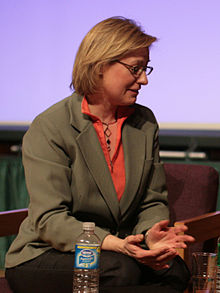Our website is made possible by displaying online advertisements to our visitors.
Please consider supporting us by disabling your ad blocker.
Rosalind Picard
Rosalind Picard | |
|---|---|
 Rosalind Picard at the Veritas Forum Science, Faith, and Technology session on "Living Machines: Can Robots Become Human?" | |
| Born | May 17, 1962 |
| Alma mater | Georgia Institute of Technology (BS) Massachusetts Institute of Technology (SM, ScD) |
| Scientific career | |
| Institutions | MIT Media Lab |
| Thesis | Texture modeling: Temperature effects on Markov/Gibbs random fields (1991) |
| Doctoral advisor | Alex Pentland Jae Soo Lim Sanjoy K. Mitter |
| Website | web |
Rosalind Wright Picard (born May 17, 1962)[1] is an American scholar and inventor who is Professor of Media Arts and Sciences at MIT, founder and director of the Affective Computing Research Group at the MIT Media Lab, and co-founder of the startups Affectiva[2] and Empatica.[3]
She has received many recognitions for her research and inventions. In 2005, she was named a Fellow of the Institute of Electrical and Electronics Engineers for contributions to image and video analysis and affective computing.[4] In 2019 she received one of the highest professional honors accorded an engineer, election to the National Academy of Engineering for her contributions on affective computing and wearable computing.[5] In 2021 she was recognized as a Fellow of the ACM for contributions to physiological signal sensing for individual health and wellbeing.[6] In 2021 she was elected to the National Academy of Inventors,[7] which recognizes outstanding inventions that have made a tangible impact on quality of life, economic development and the welfare of society. In 2022 she was awarded the International Lombardy Prize for Computer Science Research,[8] which carries a €1 million award, which she donated to support digital health and neurology research to help save the lives of people with epilepsy and children susceptible to sudden infant death syndrome.[9][10][11]
Picard is credited with starting the branch of computer science known as affective computing[12][13] with her 1997 book of the same name. This book described the importance of emotion in intelligence, the vital role human emotion communication has to relationships between people, and the possible effects of emotion recognition by robots and wearable computers.[14] Her work in this field has led to an expansion into autism research and developing devices that could help humans recognize nuances in human emotions.[15]
- ^ Rosalind Wright Picard - Faculty Personnel Record Archived 2020-09-20 at the Wayback Machine, Massachusetts Institute of Technology, November 30, 2017
- ^ Kerstetter, Jim (February 2, 2013). "Building better Super Bowl ads by watching you watch them". CNET. Archived from the original on June 6, 2013. Retrieved February 3, 2013.
- ^ "Crowdfunding medical devices raises money — and questions". Archived from the original on 2018-04-13. Retrieved 2017-06-22.
- ^ "2005 Fellows". IEEE Boston. 2005. Archived from the original on 2008-05-17. Retrieved 2008-05-05.
- ^ "National Academy of Engineering elects 86 members and 18 foreign members". Archived from the original on 2019-03-31. Retrieved 2019-02-07.
- ^ "ACM Names 71 Fellows for Computing Advances that are Driving Innovation". Retrieved 2022-01-20.
- ^ "National Academy of Fellows List". Archived from the original on 2023-01-10. Retrieved 2022-08-25.
- ^ "Premio Internazionale Lombardia è Ricerca". Archived from the original on 2022-11-10. Retrieved 2022-11-09.
- ^ "Rosalind Picard awarded with the Lombardy 'Nobel': Niguarda and Buzzi research projects with artificial intelligence to save lives". La Repubblica (in Italian). Archived from the original on 2022-11-11. Retrieved 2022-11-11 – via MSN.
- ^ "Lombardia is Research: the scientist Rosalind Picard awarded". 9 November 2022. Retrieved 2022-11-11.
- ^ "Lombardia and Research Award to Rosalind Picard:she will collaborate with Buzzi and Niguarda". Archived from the original on 2022-11-11. Retrieved 2022-11-11.
- ^
Kleine-Cosack, Christian (October 2006). "Recognition and Simulation of Emotions" (PDF). Archived from the original (PDF) on May 28, 2008. Retrieved May 13, 2008.
The introduction of emotion to computer science was done by Pickard (sic) who created the field of affective computing.
- ^ Diamond, David (December 2003). "The Love Machine; Building computers that care". Wired. Archived from the original on May 18, 2008. Retrieved May 13, 2008.
Rosalind Picard, a genial MIT professor, is the field's godmother; her 1997 book, Affective Computing, triggered an explosion of interest in the emotional side of computers and their users.
- ^ "Publication of Affective Computing". MIT Press. Archived from the original on March 28, 2008. Retrieved 2008-05-05.
- ^ Nasr, Susan (November 2006). "Help for Autism: A new device teaches the interpretation of facial cues". MIT. Archived from the original on 2011-06-07. Retrieved 2008-05-05.
Previous Page Next Page


